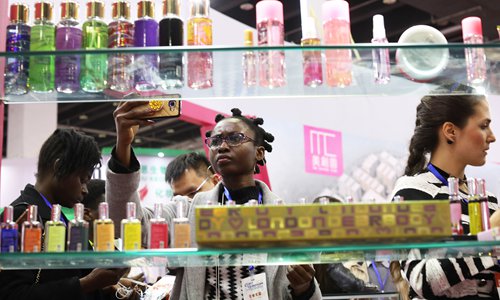HOME >> BUSINESS
Yiwu entrepreneurs outsmart Trump tariffs
By Xie Jun Source:Global Times Published: 2019/6/19 22:12:43
Cross-Pacific orders broken into small ones

Foreign traders browse goods in Yiwu's commodity mall. File photo: VCG
Entrepreneurs in Yiwu, East China's Zhejiang Province, who are particularly adept at overseas trade, are using such tactics as small-volume exports and shifting the focus of their trade to fend off the blows of rising tariffs on exports to the US.
Breaking down orders into small lots, taken by some small-scale entrepreneurs, has proved quite effective. Yiwu is famous around the world for its commodity trade and vibrant markets.
"We found that the China-US trade war has little, or I can say almost no, impact on our business with the US," Liu Wei, CEO of Yiwu-based fashion exporting company Wentou Group, told the Global Times.
The US is Wentou's focus market, accounting for about 80 percent of the company's clients.
But even with the pressure from the escalating trade friction between China and the US, Wentou's revenues from US orders are still up 57 percent year-on-year so far this year, and Liu hopes for a 100 percent increase for the full year.
According to Liu, she has discussed with her US clients to the practice of breaking large orders into what she called "fragmented orders," meaning that she would mail the products, which are fashion items like clothes and handbags, in small volumes by express delivery to US clients at faster frequency to avoid tariffs.
In 2016, the then US president Barack Obama signed a bill to scrap import taxes on products with a value of less than $800, according to media reports.
"Our US clients used to place one big order every half year, but now they place an order every other day, or every other week, so that the volume of each order is small," Liu said. "But the total order volume has not fallen."
When this tactic isn't useful, Chinese entrepreneurs negotiate with their US clients how to divide up the increased tariffs.
Liu said that recently some of her friends, who are also small-scale commodity traders, give receptions to US clients who have come over to China to discuss the extra tariffs. "Many of them are showing the US clients around the local factories to let them see that Chinese workers are doing a hard job, persuading them to take a bigger share of the extra tariffs," she said.
On Monday, the US government held a hearing about its plan to increase import tariffs on $300 billion worth of Chinese commodities, with objections filed by US industry associations and companies, according to media reports.
"From what I saw, US clients actually need and like Chinese products. Those products meet their demand. What is taking place at the policy level is not welcomed by businesspeople in the US," Liu said. "As long as demand exists, I don't think the trade war will be a big problem," she said.
In the first four months this year, Yiwu exported 3.88 billion yuan ($562 million) worth of small commodity goods to the US, up 20.9 percent year-on-year, Yiwu customs data showed.
Emerging markets
Some Yiwu entrepreneurs are also shifting their focus away from the US and Europe to other markets to diversify risks. Wang Jinghua, general manager of the Yiwu Babyshow Maternal Co, which exports baby maternal and infant products, is one of them.
Wang started doing business in developed markets like Canada and the US, but now he is shifting his focus to countries and regions along the Belt and Road Initiative (BRI), which he found are growing much faster than the US and European countries.
According to Wang, before 2017 his company had almost no business in BRI markets. In 2017, BRI sales accounted for about 10 percent of his overall sales. In 2018 the percentage grew to 30 percent and for this year, he anticipates that 60 percent of his company's revenues would come from BRI countries, including Nigeria and Uganda.
"Our sales to the US and European countries have not changed too much in the past few years, but because of the rapid rise of BRI market sales, we now don't attach that much importance to those developed markets," he told the Global Times.
He also expressed a preference for those new markets over the US and Europe. "Striking a deal with US and European markets is often a long process. Once it took us about one year to nail a deal with a Canadian shopping mall. But merchants from developing countries often decide promptly, and what's more, they are more loyal than many US and European clients."
"With multiple trading channels, we can set our minds at ease with the fluctuation of the US markets. If they really abandon business with us, that would be still fine for us because we have other alternatives," he said.
Posted in: ECONOMY